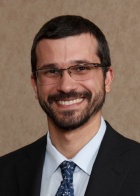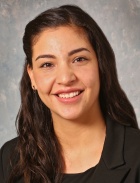Q&A with the Diversity, Equity, and Inclusion Team
The law school’s DEI initiatives have always been collaborative, but they’ll be led forward through the combined efforts of Professor Luis Chiesa, the new vice dean for diversity, equity, and inclusion, and Program Coordinator Amber Melvin ’13. We asked them to reflect on the work ahead and the opportunities it represents.
Professor Luis Chiesa
Vice Dean for Diversity, Equity, and Inclusion

Professor Luis Chiesa
What draws you to this work?
I’m the only tenured (or tenure track) Latin@ on the law faculty. With this comes great responsibility. I joined the UB faculty in 2013 after six years at Pace Law School. During my first semester at UB, a group of students asked if I would agree to be honored at the Students of Color Dinner as their Professor of the Year. I was surprised. Why did the students feel I was worthy of this honor when they didn’t really know me? Then I realized the award was given not for what I had done, but for what they hoped and expected I would do for the UB Law community. It was not a celebration of achievements, but a call to service.
I have done what I can to answer that call. I wrote an article exploring the theoretical and doctrinal underpinnings of mass incarceration, and a couple of pieces exploring the gendered history and scope of sexual assault laws in America. I’ve had difficult conversations about race and criminal justice with students. I’ve served as faculty adviser for the Latin American Law Students Association, and I’ve moderated and organized panels on race and policing. Currently, I chair the new university-wide Police Advisory Committee.
In the wake of George Floyd’s senseless killing and the massive protests that followed, I feel called to do what I can to meet this moment. For me, this role is both the culmination of years of scholarly and pedagogical engagement with issues of diversity and equity, and a way of honoring my culture and identity.
How do you hope to make DEI integral to the workings of the school?
The DEI office is relatively new, and we are still claiming our space and role in the law school community. That said, under Tolu Odunsi and her predecessors, the office has already come a long way in integrating its work into the broader workings of the school. The DEI office is engaged with several distinct, interconnected law school communities. The most visible ones are students, staff, faculty, alumni, and members of the legal community.
The office continues to support undergraduate students from underrepresented communities who are interested in legal studies by offering the award-winning Discover Law program. In addition to supporting undergraduate students, Discover Law serves as a pipeline for students coming to UB law school, which enriches our student body and further diversifies our community. I hope to continue to support Discover Law by securing permanent and substantial funding so it can become a fixture at the law school.
Regarding current students, I want the DEI office to continue to work closely with student associations such as the Black Law Students Association (BLSA), the Latin American Law Students Association (LALSA), OUTLaw, and the Asian Pacific American Law Students Association (APALSA), to foster a more inclusive and welcoming environment for minority students.
In terms of faculty, I will engage my colleagues regarding skillful ways of addressing race-related issues in the classroom. The hope is to provide faculty with tools to competently and sensitively navigate the conversations that inevitably occur when people of different backgrounds come together in class to discuss the defining issues of our time. I hope to have similar conversations with law school staff, especially those who interact with our students.
How have alumni and the wider legal community been involved with these efforts? Do you see that relationship growing as you move forward? If so, how?
Our alumni and the wider legal community are instrumental to the success of the law school as a whole, and to our diversity-related initiatives in particular. It is thanks to their continued interest and financial support that we have been able to establish and expand some of our key DEI projects, including, but not limited to, our recently created Social Justice and Racial Equity Fund, diversity scholarships and summer fellowships, and our award-winning Discover Law program. More broadly, we work closely with multiple partners in the university, as well as in the wider legal community, both in Buffalo and across the nation, from members of the minority bar, to law firms, to other organizations and individuals.
And, of course, our alumni and friends contribute in ways that go well beyond funding our initiatives. They also volunteer their time to participate in panels and to mentor our minority students. They teach courses in the JD program. They support our graduates at commencement, the Students of Color Dinner, and other events. As you can see, our alumni and the legal community are the backbone of the law school in general and the DEI Office in particular, and I look forward to deepening those partnerships in the months and years ahead.
How does this work fit with law school’s overall social justice mission?
The DEI office’s work is essential to advancing the law school’s social justice mission. Promotion of diversity and achievement of equity is an essential component of achieving social justice. UB School of Law has always been committed to providing an environment where students, staff and faculty from underrepresented minority groups excel personally, academically and professionally. The DEI office seeks to deliver on this commitment by collaborating with the various law school departments and community partners to increase the diversity of our community, achieve equity and ensure that all members of our community feel included, safe, welcome and supported.
How are the faculty supporting these efforts?
My faculty colleagues support these efforts in multiple ways. Perhaps the most salient one is by their participation in the new Diversity, Inclusion and Equity Committee. Under the able guidance of Professors Christine Bartholomew and Michael Boucai, the DEI Committee is forming diversity and equity proposals for the faculty’s consideration. These will include recommendations to ensure a climate of tolerance and respect in the law school, suggestions to further diversify the faculty and student body, and ways we can further engage alumni and the broader community. The faculty will take up many of these issues and, along with Dean Abramovsky, will work to implement the measures and recommendations that are adopted.
How will you involve students in the work?
Students are essential to the work of the DEI office. After all, the law school exists primarily to serve them. The office is in continuous communication with the groups and associations that represent students from underrepresented communities, including APALSA, LALSA, BLSA and OUTLaw. As an example, I just reached out to the president of APALSA to ask to meet with its members to discuss how the law school can ensure that our Asian and Asian American students feel safe and welcome. We felt it was particularly important to do this given the recent spike in violence against Asians and Asian Americans in this country.
Students also assist us with several programs and initiatives. For example, the school hires law students to support the undergraduates who enroll in Discover Law. Our research assistant, law student Davewin Meade, is doing fantastic work on a Racial Justice Toolkit with my predecessor, Tolu Odunsi.
Given recent instances of violence nationwide against people of color, including the surge in attacks on Asian Americans that you reference above, what can the law school and the legal community do to combat hatred and violence?
The most immediate thing we must do is to stand in solidarity with those who are impacted by these senseless and racist acts of violence. As I said in a joint statement with Dean Abramovsky and Vice Dean Bernadette Gargano sent to our students, faculty and staff after the recent murders in the Atlanta area, the prejudice and bigotry that fuels these tragedies cannot be tolerated.
We must also take affirmative steps to ensure that Blacks, Latin@s, Asians, Asian Americans, women, members of the LGBTQ+ community and all other members of historically oppressed minorities feel safe, welcome and supported in our law school. This is why we will work with our Asian Pacific American Law Students Association and our other student groups to make sure that every member of our community feels supported and safe.
Is there ever a point at which you’ll be satisfied that the law school is diverse, equitable and inclusive enough?
I don’t think it is helpful to think about these issues in this way. When I say “we,” I’m not solely referring to the law school. I’m talking about our region, state and country as a whole. If there’s anything that the last several years have taught us, it is that we are nowhere near to living up to our basic promise and ideal that “all [persons] are created equal.”
Along with my fellow faculty, staff and students, I know the road to securing equality and justice for all is long, windy and tortuous. Progress is not linear. It occurs in fits and starts, and sometimes even takes a step back before once more lunging forward. While the road to achieving justice and equality is bumpy and perilous, I remain optimistic that we shall overcome. As Martin Luther King Jr. so powerfully said, “The arc of the moral universe is long, but it bends toward justice.”
Amber Melvin ’13
Program Coordinator

Amber Melvin '13
Amber Melvin is a 2013 graduate of UB School of Law, and the Program Coordinator for the law school’s Office of Diversity, Equity, and Inclusion, as well as its Office of Undergraduate Studies. A former member of the law school’s Admissions team, she served as the student RA for the Discover Law program in 2012, its inaugural year, and has been involved with the program in various capacities since she joined the law school's administrative staff in 2015.
How can our undergraduate program in law help the law school accomplish its diversity goals?
The undergraduate program in law can help with the School of Law’s diversity goals by creating a more established pipeline at the undergraduate level. Undergraduate students now have access to law classes that are taught by law school faculty, giving them an unmatched introduction to the law. We know that early exposure to the law is critical for students to be able to envision themselves in the profession. Being able to major or minor in law at UB allows them to explore the law when they might not otherwise have been able to.
Has Discover Law yielded successful students to study at UB Law?
It certainly has! Eleven Discover Law alumni have enrolled at UB law; nine have graduated and two will graduate this year. Although we would like all of our Discover Law alums to attend UB law, many have gone on to other law schools as well.
Discover Law will be offered in a totally virtual format this year. What will that look like?
The planning of the virtual program is still in the works, but we fully intend to offer a program that is just as enriching as it would be in person. This includes legal-related instruction, as well as panels and discussions with alumni and community members. We will have two UB School of Law students serving as virtual resident assistants to support our students. There will be an emphasis on virtual social events to create that cohesive cohort feel for the participants. Ultimately, we know that the benefits of this program far exceed any limits to the format.